8 Employee social media protest trends in 2020 for risk management professionals to remain aware of
The Rise of Employee Social Media Protests
Employee protests have been around ever since companies have been around. The methods adopted in conducting protests have been quite diverse; right from maintaining a moments silence to silent gatherings, sit-ins, walkouts, joint petitions, sloganeering etc. However over the recent few years, the evolution of employees using social media to voice their concerns has increased significantly.
The primary objective of conducting protests has pretty much remained the same over the years - To gain the management’s attention on an issue or issues which the protesting employees disagree with and push the management to take necessary action. When it comes to gaining attention, social media is a powerful medium. The word can spread very quickly to a large number of people and in the process attention can be captured rapidly.
However, another factor which has seen employees increasingly prefer using social media as a medium to voice their concerns is the modern day workforce which mainly comprises Generation Y (also referred to as the Millennials) and Generation Z. These are generations which are regarded as highly tech savvy owing to their upbringing in the digital era.
The expectations of individuals belonging to these generations goes much beyond the typical remuneration, bonuses and other perks; these are individuals who expect much more from their employers. According to a finding from the the Society for Human Resource Management 2019 Annual Conference & Exposition, the Top 10 Workplace Trends for 2019 were:
- Fostering the relationships between workers and robots
- Creating flexible work schedules
- Taking a stand on social issues
- Improving gender diversity
- Investing in mental health
- Addressing the loneliness of remote workers
- Upskilling the workforce
- Focusing on soft skills
- Preparing for Generation Z
- Preventing burnout
Given the trends above, it is no surprise that the 8 Employee Social Media Protest Trends in 2020 have revolved around:
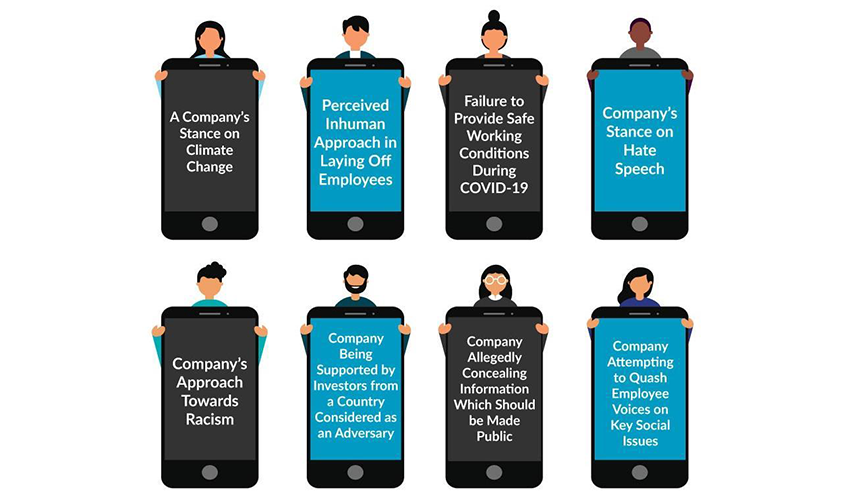
In this article, we look at some of the more significant case studies of employee social media protest trends since January 2020. Awareness of these trends would help risk management teams work proactively with various stakeholders within the organisation (and in some cases outside the organisation too) to foresee such potential protests and manage them effectively.
Protests Trends
1 - Company’s Stance on Climate Change
Climate change, one of the most burning subjects of contemporary times is something which has seen progressive governments and private corporations act proactively. For those companies who have shown limited concerns towards climate change have also found themselves in a position where they have had to take actions albeit unwillingly to project an image of a responsible company.
One of the biggest names who has witnessed strong criticism from its employees has been Amazon. Not just for its perceived limited approach to tackle the challenge of climate change but also on its external communications policy.
In January, more than 340 employees participated in a protest against the company’s external communications policy and an apparent threat of termination that was issued to two of its employees for speaking publicly against the company’s policies on climate change.
The incident led to the terminations of certain individuals however the employees did manage to garner public and media attention around the issue.
2 - Perceived ‘Inhuman Approach’ in Laying Off Employees
Managing employee layoffs has always been a sensitive matter however employee layoffs owing to COVID-19 has taken a whole different meaning. While a number of businesses have been compelled to resort to retrenchment of employees, doing so sensibly has never been more important than now.
At a time when uncertainty and fear amongst the global population is widespread, companies laying off employees need to adopt an approach which is more humane.
A number of companies have been accused of resorting to abrupt layoffs. In some cases, layoffs have happened via email. IndiaBulls, a large real estate company in India and Cult.Fit an Indian fitness company are two such cases out of several others wherein employees felt that they were let go in a very ‘inhuman’ way.
In the case of IndiaBulls who apparently issued pink slips to around 2000 employees, it witnessed employees taking to Twitter to vent their anger. Protesting employees used a hashtag called #indiabullsresign; the volume of tweets using this hashtag was significant enough to gain a trend on Twitter.
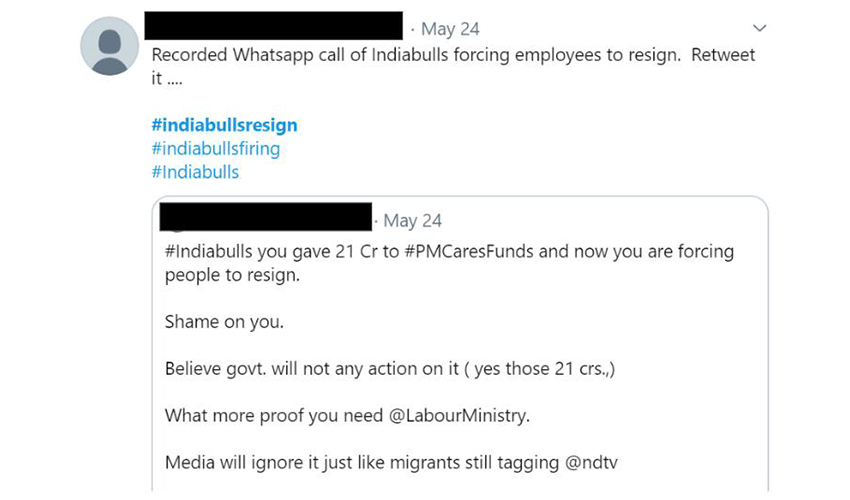
In the case of Cult.Fit, employees took to LinkedIn and Instagram to express their anguish.
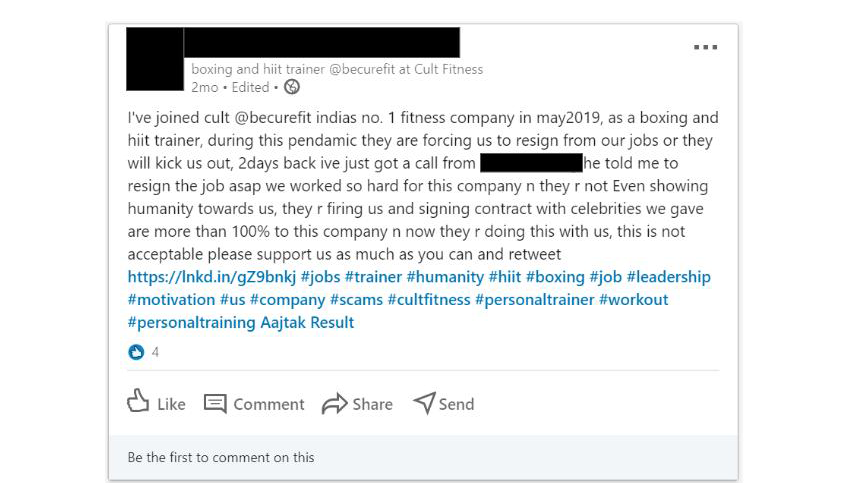
3 - Failure to Provide Safe Working Conditions During COVID-19
While providing employees with a safe working environment has been a priority for most responsible companies, COVID-19 has pushed companies even more; especially those who have remained operational to do much more to ensure the wellbeing of its employees.
Regardless of how many COVID-19 specific safety measures get implemented, the potency of the virus is such that nothing can be 100% foolproof.
A number of companies have witnessed their employees contracting the virus, in some instances the cases have proven to be fatal.
Amazon, Target and Walmart are some examples where employees have voiced concerns over their safety. Amazon saw employees in as many as 74 warehouses in the United States being infected with COVID-19 and also resulting in the death of one warehouse manager. According to a report by NBC News, hundreds of Amazon tech and fulfillment center employees called out a sick Friday virtually by organising an all day live-stream on Facebook and YouTube to protest against unsafe working conditions.
In Germany, a group of doctors held a nude protest to draw attention towards the lack of personal protection equipment which puts them at risk of contracting COVID-19. Their protest which has been termed Blanke Bedenken, or Naked Qualms has gained a lot of support on Twitter under #BlankeBedenken 
4 - Company’s Stance on Hate Speech
In late May, Facebook witnessed significant internal discontent amongst a section of its workforce after a post from President Donald Trump which was considered incendiary on which Facebook had chosen to not act against.
A number of its employees took to Twitter to publicly criticise the company’s stance. Tweets from influential Twitter handles such as @jasontoff and @stirman received more than 190,000 likes and 16,700 likes respectively.
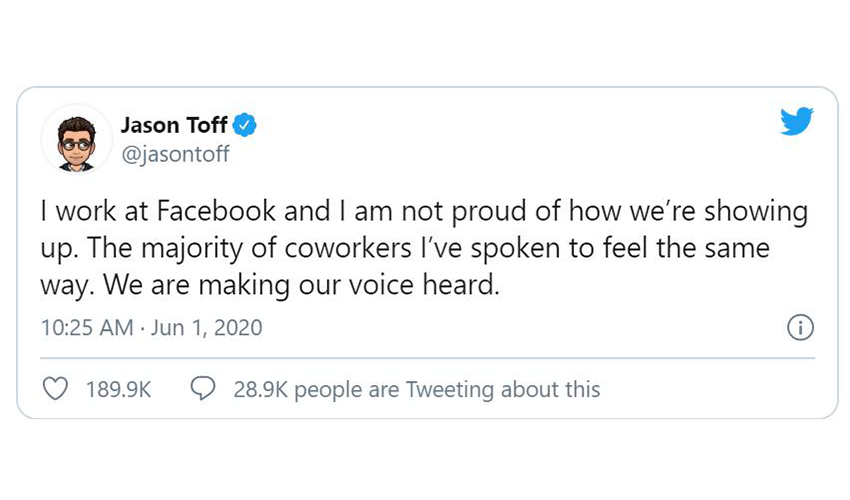
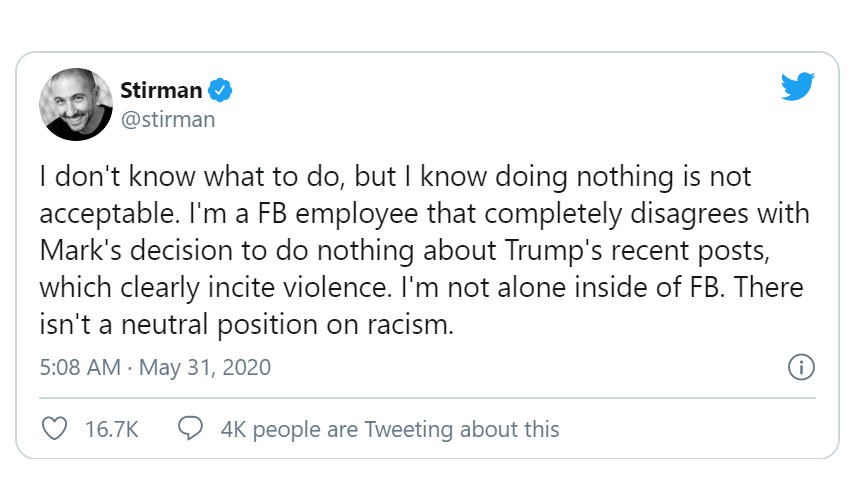
5 - Company’s Approach Towards Racism
Although an age old issue, racism only continues to dominate headlines across the globe. Social media has served as the most potent platform for activists to further their anti racism movements. Black Lives Matter (BLM) is a popular example.
The modern day workforce expects its employers to take a stance of non-tolerance towards racism and does not shy away from expressing its displeasure if they find little or nothing being about matters concerning racism. Even if that means that the issue may not be directly related to the company, in a number of cases employers are expected to adopt a strong stance on significant events such as the killing of George Floyd.
In the wake of the George Floyd killing, there have been a number of cases where individuals belonging to various organisations have made insensitive comments on social media. Some have had a racial undertone, while some have been clearly discriminatory however in most cases, the employers chose to fire those employees. Boeing and FedEx are two examples of companies who adopted a zero tolerance approach towards instances of racism.
While at Adidas, a group of employees who started a sort of movement against the company’s approach towards handling the issue of diversity led to the resignation of its global head of human resources. One of the employees took to Instagram to voice his thoughts.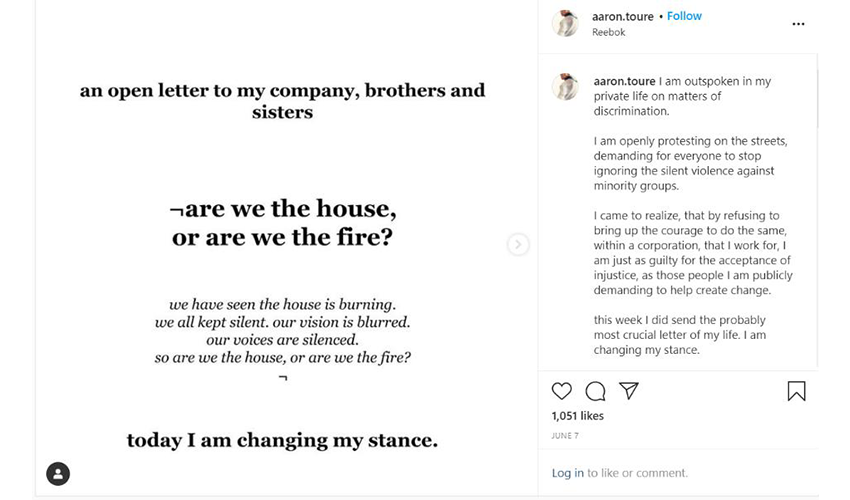
6 - Company Being Supported by Investors From a Country Considered as an Adversary
Amidst growing sense of nationalism which has been witnessed across several countries, there have been a number of instances wherein employees have been vocal on their employer having business ties with companies belonging to a country perceived as an ‘adversary’.
The recent India - China border escalation is a case in point which has led to a part of the population in India which has called for a ban on Chinese products.
Zomato, an Indian food tech company which has investments from Chinese investors, saw some of its employees hold a physical protest for accepting Chinese investments. Although this was a physical protest, images from this protest were circulated extensively on social media platforms, and received coverage from major news outlets which further drew attention towards the protest.
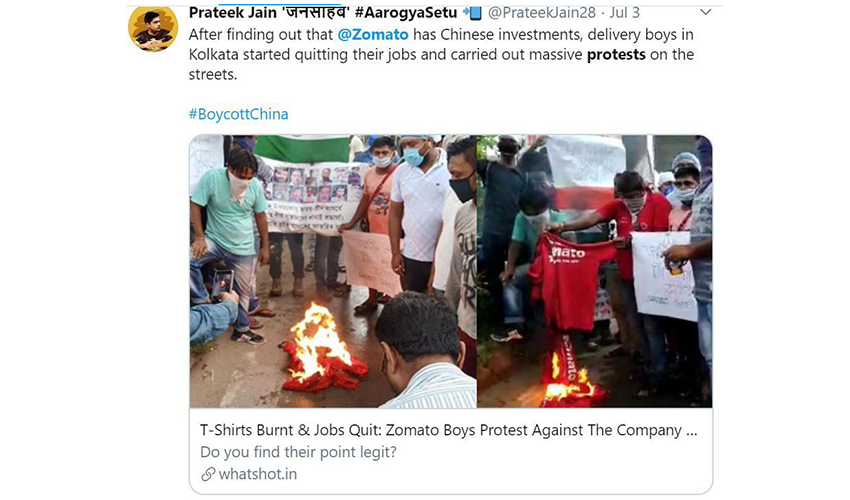
7 - Company Allegedly Concealing Critical Information Which Should be Made Public
The growing expectation for companies to maintain transparency has never been much greater than it is today. However, transparency tends to be interpreted differently by most employees.
Especially in times of a crisis, such as COVID-19, a company is expected to be uber transparent in the interest of all its stakeholders - employees, customers, shareholders and many times the general public.
In one such case in the United States, the employee of a rehabilitation center was terminated for posting on social media about the facility turning into a COVID-19 treatment centre.
According to the employee, the center’s decision to not make that information public was incorrect and she was of the opinion that such information should be made public which led her to share the information on social media.
8 - Company Attempting to Quash Employee Voices on Key Social Issue
Freedom of speech is something that is not only considered critical by most modern day workers but it is also something which is seen as a right. While a number of employees may find it acceptable for their employer to not participate actively on a key social issue, they would find it completely unacceptable if the employer tries to sabotage or discourage their participation on an issue which is important to them.
Nearly 150 employees of the ad agency Periscope in Minneapolis staged a walkout in protest against the parent company who allegedly interfered in the agency’s communications over #BlackLivesMatter.
While the protest was in the form of a physical walkout, it stemmed from the parent company’s attempt at sabotaging the participation of Periscope and its employees on social media in support of #BlackLivesMatter.
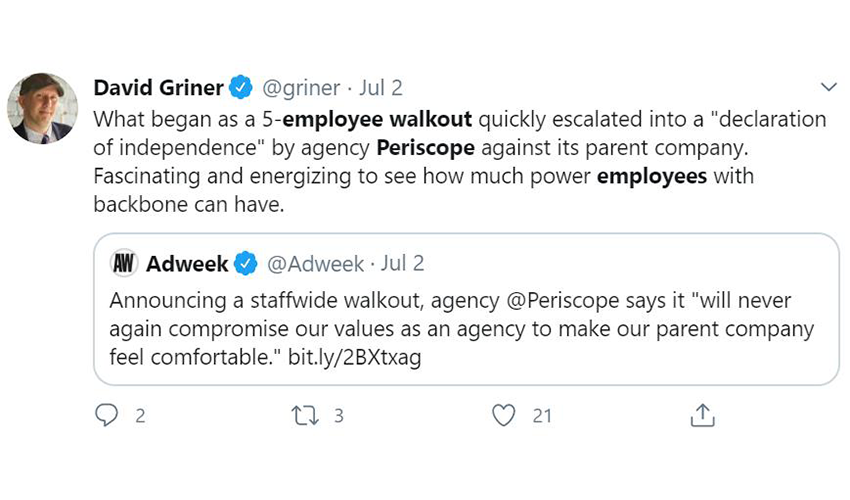
8 Takeaways from the 8 Employee Social Media Protest Trends
- Employee social media protests are here to stay and only grow.
- Successful protests will make it to the tabloids and receive attention on social media platforms quickly.
- Only a section of employees will participate; very few will lead.
- Avoiding or delaying addressing the issue being raised by protesting employees is not a good strategy; it would most likely backfire.
- Most times, issues raised are addressable.
- Adopting a human approach shall gain more significance.
- Some employees will remain dissatisfied, no matter what.
- Managing employee social media protest is not just limited to good PR. There are multiple consequences hence requiring the attention of multiple stakeholders.

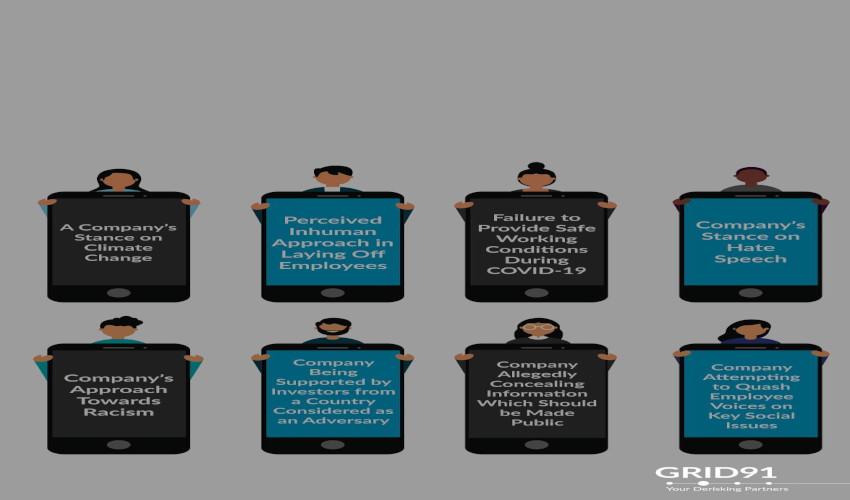
Caowept
3 years agoBaowept
3 years agoKizcisse
3 years agobinnie.halina@googlemail.com
2 years agoPasquale
1 year agoBea
1 year ago